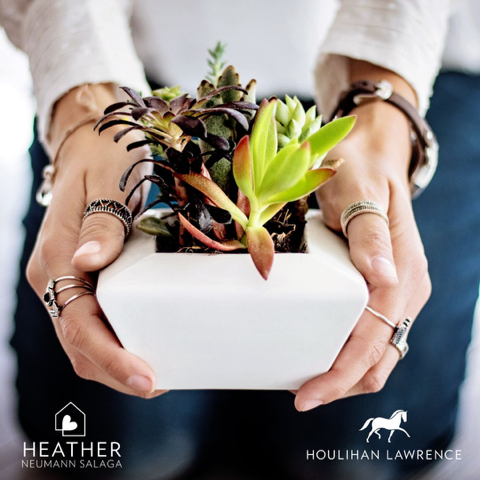
You wouldn’t know it after this week’s storm, but spring is coming! And with its arrival comes the perfect time to infuse a breath of fresh air into your home – both metaphorically and literally. Adopting eco-friendly practices not only contributes to a healthier planet but also creates a more sustainable and harmonious living space. With a trend towards buyers - especially Millennial and Gen Z - preferring more environmentally conscious homes, here are seven easy do-it-yourself ways to make your property more ‘green’ this spring.
1. Use low VOC Paint:
Nothing freshens up your home like a new coat of paint. Opting for paint with low or no volatile organic compounds (VOCs) is a thoughtful choice for both your indoor air quality and the environment. Traditional paints often release harmful chemicals into the air during and after application, contributing to indoor air pollution. Low VOC paints, on the other hand, contain fewer noxious fumes, minimizing the impact on the air you breathe. Not only do these paints reduce the risk of respiratory issues, headaches, and eye irritation during the painting process, but they also support a more sustainable lifestyle.
2. Install Energy-Efficient Lighting:
One of the quickest and easiest ‘green’ DIY options, swapping out traditional incandescent bulbs for energy-efficient LED or CFL bulbs has immediate environmental impact. Not only do these alternatives use less energy, but they also last longer, saving you money in the long run. In addition, consider installing dimmer switches or automatic sensors in rooms to control the amount of light you need in different spaces and reducing your energy consumption further.
3. Use Natural Cleaners:
Spring cleaning is a tradition, but the chemicals in many commercial cleaning products can harm the environment. Create your own eco-friendly cleaning solutions using simple ingredients like vinegar, baking soda, and lemon. Mix equal parts water and vinegar for an all-purpose cleaner, sprinkle baking soda on surfaces for a gentle scrub, and add lemon for a refreshing scent. If making your own cleaners isn’t for you, look to eco-friendly options at the grocery store.
4. Opt For Reusable Cloth Products:
Reduce your dependence on single-use items by incorporating reusable alternatives for cleaning the bathroom, kitchen, and other areas of your home by swapping disposable paper towels for cloth towels. Buy cloth napkins or, if you’re a whiz with a sewing machine, create your own from old fabrics or repurposed bed linens. Not only will you save money, but you'll also significantly cut down on the amount of waste your household produces and adds to landfills.
Improve your indoor air quality by introducing natural air purifiers into your home. Certain houseplants, such as snake plants, spider plants, and peace lilies, are known for their air-purifying properties. Not only do they add a touch of greenery, but they also filter out common indoor pollutants. This DIY solution not only enhances the aesthetics of your home but also contributes to a healthier living environment.
6. Water Conservation in the Garden:
As spring arrives, many of us turn our attention to gardening. Make your gardening endeavors more environmentally friendly by adopting water-saving practices. Install a rain barrel to collect rainwater for watering plants. Use mulch around your garden beds to retain soil moisture and reduce the need for frequent watering. If you’re adding plants or overhauling your garden, one of the biggest impacts can be felt by planting native and drought-resistant plants, as they are well-suited to the local climate and require less water.
7. Create Your Own Fertilizer:
Home composting is a simple yet powerful practice that anyone can adopt. Composting involves turning kitchen scraps and yard waste into nutrient-rich soil, providing a natural alternative to traditional waste disposal methods. The process is straightforward – collect kitchen scraps like fruit peels and coffee grounds, layer them with yard waste, and let nature work its magic. The result? 'Black gold' – a dark, crumbly compost that acts as a natural fertilizer. Beyond environmental benefits, home composting fosters a sense of connection to the earth, turning everyday waste into a valuable resource that nourishes our gardens and contributes to a healthier planet. And no…it doesn’t smell!
As you can see, being ‘green’ doesn’t have to mean expensive retrofits and massive outlays of capital. Going green is a spectrum and making small changes every day can have a huge impact. These ideas offer practical ways to reduce waste, save energy, and create a healthier living space. By incorporating these changes, you not only contribute to a healthier planet but also cultivate a more sustainable and mindful lifestyle. Embrace the green spirit of spring, and let your home blossom into an eco-friendly haven.
Learn more about Heather Neumann Salaga https://heathersalaga.houlihanlawrence.com/